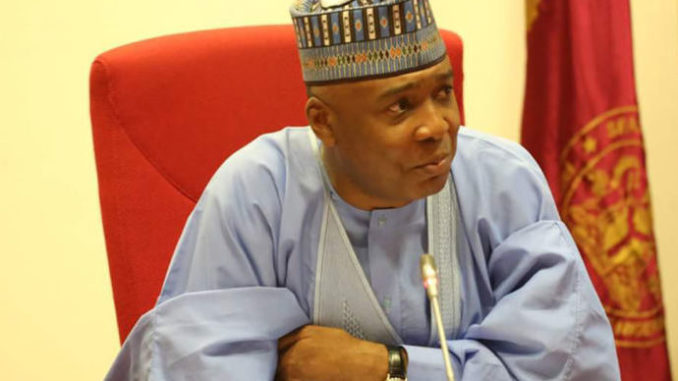
Policymakers and Nigerians at large have been advised to focus on the real economic issues that have pushed Nigeria’s economy into crisis, with a view to exiting the current economic crisis.
The President of the Senate, Dr Bukola Saraki, the Osun State governor, Rauf Aregbesola and Emir of Kano, Muhammadu Sanusi II, who gave the advice, also listed conditions necessary to exit recession and avoid future chaos.
They spoke in Lagos at the weekend during The Point Newspaper’s public presentation and first annual conference on economic regeneration.
Sanusi, who was the special guest of honour, blamed the current economic recession on decades of policy failures, which become a clog in the wheel of Nigeria’s economic development.
He said this just as Saraki and Aregbesola cautioned Nigerians against over-dependence on foreign products at the expense of locally made goods.
Sanusi, however, said stopping Nigerians from consuming imported goods was not the biggest problem confronting the country, but the lack of local production of essential commodities and goods and the will to change policies that would drive the growth of quality local production.
The Emir noted, “We have had decades of policy failure. The last decade was Africa’s miracle decade because we moved from a continent that was known for hunger and war to a decade where people we were seen as a land of opportunities and investments.
“Nigeria grew at seven per cent every year through out that period as the economy doubled and we became the biggest economy in Africa but lack of policy made us lose all proceeds.”
Sanusi, therefore, advised the Federal Government to take a decisive step on the type of economy it would want to run.
According to him, the time had come for the government to differentiate between reality and passion.
“I objected to the increase in the minimum wage from N12, 000 o N18, 000 in 2011 because government only had passion to reward the electorate and failed to consider the consequences along the line. By 2011, the Federal Government was spending about 80 per cent of its revenue on personnel and oil price was $110 per barrel and we were producing over two million barrels per day. That was a failed policy,” he said.
Aregbesola, in his speech, described the theme of the annual lecture series, “What is the Economics of Change?” as, “a play on word that indirectly put to task the campaign mantra of the ruling All Progressives Congress, which promised Nigerians a change for the better during last year’s election campaign.”
He said a decline in the price of crude in the international market had always been the cause of the recession the country had fallen into at different periods.
He also attributed the severity of the ongoing recession to lack of foresight and planning on the part of government, adding that the difference between the past recession and the current one was the fact that the previous ones never lasted this long.
“The fundamental problem is that we can no longer fund our imports because our foreign earnings have progressively declined while our taste for and dependence on foreign goods have continued to increase. This is what put pressure on the Naira, makes imported goods to become very expensive and put the economy in a tailspin,” he said.
Also speaking on the occasion, the Senate President said that the time had come for the country to diversify, stressing that it was no longer fashionable to run a monolithic economy.
Saraki, who was represented at the event by the Chairman, Senate Committee of Banking and Finance, Senator Rafiu Ibrahim, said his experience at a recent trade exhibition had made it clear that there were potentials laying waste due to over-reliance on oil, which he said had made the economy weak.
“SMEs, not government, not big corporations, hold the key to solving our unemployment problems, raising the GDP, diversifying the economy and promoting production and manufacturing in Nigeria,” he said.
He, however, said that the country had yet to fully harness its economic potentials due to the absence of adequate and deliberate interventions that could support SME development and growth.
Source: Today.ng
THE ROTTEN FISH: CAN OF WORMS OPENED OF APC & TINUBU'S GOVERNMENT OVER NIGERIA'S ECONOMIC DOWNTURN
WATCH THE CRITICAL ANALYSIS AND KNOW THE RESPONSIBLE PARTIES TO BLAME FOR NIGERIA'S ECONOMIC CHALLENGES, WHILE CITIZENS ENDURE SEVERE HARDSHIPS.Watch this episode of ISSUES IN THE NEWS on 9News Nigeria featuring Peter Obi's Special Adviser, Dr Katch Ononuju, 9News Nigeria Publisher, Obinna Ejianya and Tinubu Support Group Leader, McHezekiah Eherechi
The economic crisis and hardship in Nigeria are parts of the discussion.
Watch, leave your comments, and share to create more awareness on this issue.
#9NewsNigeria #Nigeria #issuesInTheNews #politics #tinubu THE ROTTEN FISH: CAN OF WORMS OPENED ...
DON'T FORGET TO SUBSCRIBE AND LEAVE YOUR COMMENTS FOR SUBSEQUENT UPDATES
#9newsnigeria #economia #economy #nigeria #government @9newsng
www.9newsng.com
